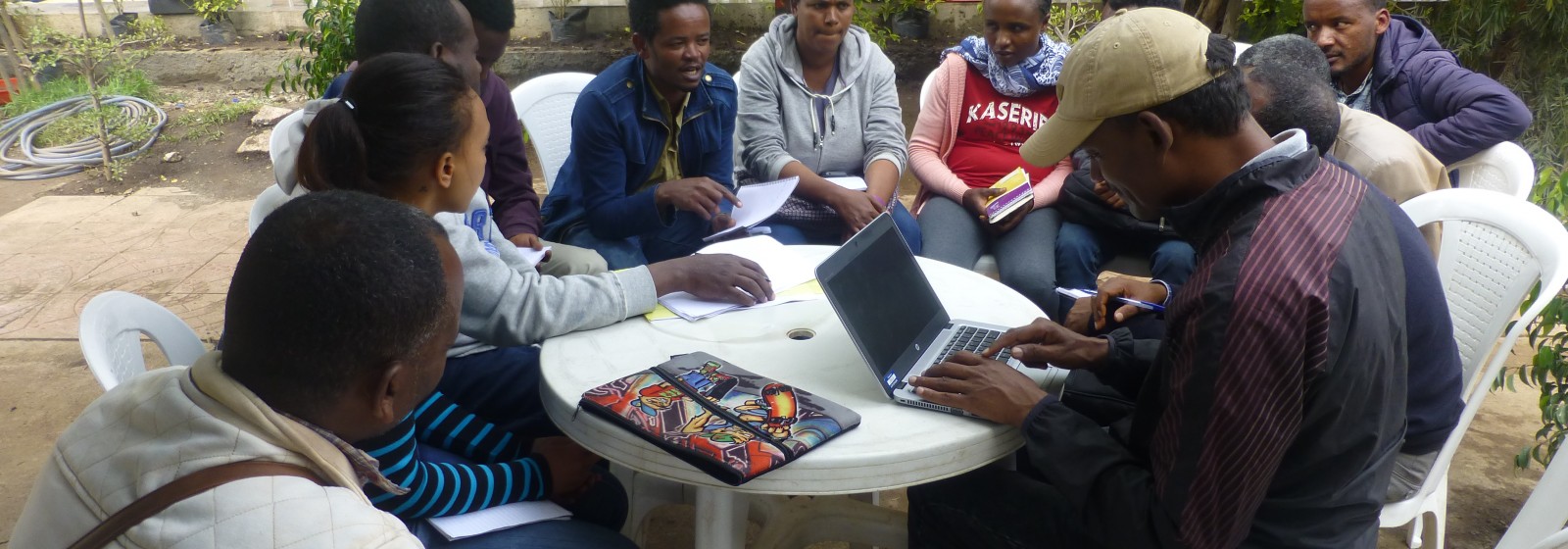The International Livestock Research Institute (ILRI) and the International Center for Agricultural Research in the Dry Areas (ICARDA) used community conversations to sensitize and induce change in the thinking and practice of preventing zoonotic diseases among communities in the Ethiopian highlands. Coordinated by facilitators from the Areka and Debre Birhan research centres, the community conversations engaged men, women, the youth, religious leaders and community leaders in an open discussion about zoonotic diseases.
About 234 (90 female) participants engaged in four community conversations in Doyogena and Menz districts in the Southern Nations, Nationalities, and Peoples’ and Amhara regions of Ethiopia in July and August 2018.
The community conversations combined a participatory training activity where women and men community groups explored their perceptions about zoonotic diseases. The facilitators used posters and stories to stimulate discussion and engage participants in deeper reflections and insight making. Community members identified more animal diseases than zoonotic diseases. Although both men and women demonstrated comparable knowledge of animal diseases, community groups acknowledged that women are more knowledgeable about animal diseases due to their gender roles in livestock husbandry.
In Menz, community members identified only a few zoonotic diseases (mainly anthrax and rabies) but they also had misperceptions about these diseases. Some believe that rabies is transmitted to humans only through the bite of affected dogs. A male participant shared a story and asserted that rabies does not transmit from the bite of pack animals to humans. They also believe that wind can carry the breath of a rabies-affected dog. A commonly held perception is that when humans are bitten by rabid dogs, an organism (a dog) would form in their body and that eating the meat of a rapid animal can cure affected humans.
Eating raw meat and drinking raw milk was common in Doyogena than in Menz. In Doyogena, a male participant in Ancha Sadicha kebele, said, ‘My grandfather had drunk raw milk all his life, and he had lived longer with no problems. I love drinking raw milk and I see no problem’. Other participants said that their ancestors ate raw meat and drank raw milk which they said was good for strength and they did not understand why researchers were now saying that drinking raw milk and eating raw meat is not good for our health, while others said eating raw meat was a longstanding tradition.
Building on participants’ views, the facilitators engaged community members in dialogue, clarified misperceptions and trained them on the zoonotic disease transmission pathways and control mechanisms of common zoonotic diseases. Community members said that the conversations made them aware of previously unknown issues related to zoonotic diseases and the importance of preventing them for the sake of their well-being.
A male participant in Doyogena said, ‘I was not aware of the consequences of drinking raw milk. I will stop drinking raw milk. When my cow or sheep gave birth, I used to hold the calf or lamb close to my chest. I didn’t know that this could expose me to diseases. I will now use gloves when I assist births. I have decided to buy and use gloves, boots and masks during cleaning of barns and handling of sick animals and attending births.’ A traditional animal healer in Menz said that he has been piercing sick animals, cutting affected areas without any protective materials. He has now decided to use protective materials.
Many community members said, ‘The health of our animals is also our health. By spending some money on protective materials and vaccination and deworming of our animals, we can gain in animal productivity and reduce animal loss due to diseases’. They have also said they had realized that the key to the health of their animals depended on improving animal management practices. In Menz, the community conversations created more demand for animal health services and participants decided to organize themselves to get animal health services such as deworming and vaccination of dogs and sheep.
A male participant reported that he started taking his sick animals immediately to the health post after understanding and observing early clinical signs of disease. Previously, he had been taking animals when they were about to die. In Menz Gera, a male participant reported that he has separated sick animals from his herd and informed his wife on the need to not give children raw milk. He added, ‘I used to keep poultry in my house. I have now constructed a poultry cage’.
Our experience shows that community conversations are powerful community-based training approaches to engage community members in collaborative learning and reflection, leading to changes in perspectives and community actions.
